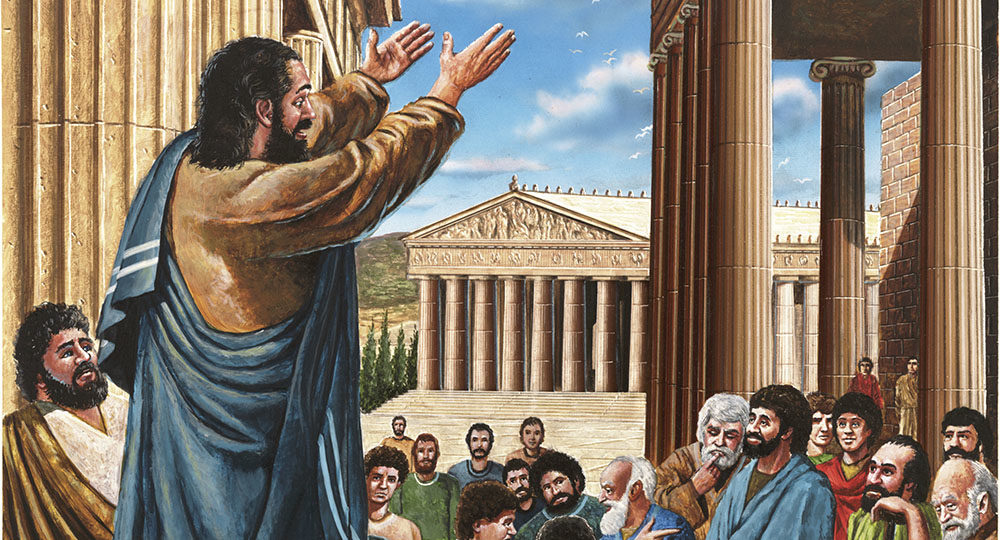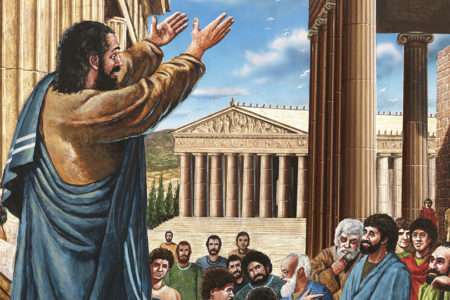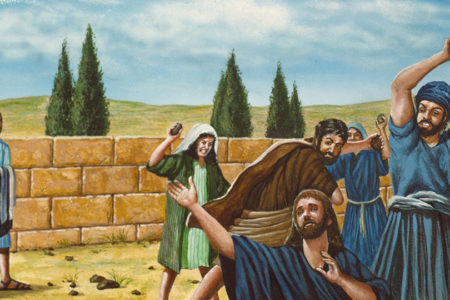Paul’s Beloved Enemies
But what about the Israelites?
The question flows through the minds of those who have pursued the compelling story of God’s ancient people across the pages of the Word of God and down the dusty roads of history.
When, at the close of the Gospel records, the disciples’ hopes for the Kingdom’s immediate appearance were dashed, multiple queries arose. What, now, about the Jew? What of the land promised to them by God—their possession forever? What of the cherished millennium-long era of Messiah’s peace and Israel’s prosperity? Was it all slipping away? Would Israel fade into the mists as a new reality arose?
Many have supposed that such was indeed the case, and that, with the inception of the Church age and the merging of Jew and Gentile in the body of Christ—“For there is no difference between the Jew and the Greek; for the same Lord over all is rich unto all that call upon him” (Rom. 10:12)—the new economy had risen upon the grave of the old. Israel had heard the death knell sounded over her future.
In the Church, all believers, Jew and Gentile, had become the spiritual seed of Abraham. “And if ye be Christ’s, then are ye Abraham’s seed, and heirs according to the promise” (Gal. 3:29). Gentiles joined their believing Jewish comrades in the Church, as the spiritual seed of Abraham, on ground leveled by the cross, enjoying the full benefits of the joint heirs with Christ legacy.
Was this, then, the new Israel? Millions have been taught that this is emphatically true.
Enter Paul
It is most ironic that the man held in perpetual disdain by his brethren after the flesh was the instrument chosen to bring us God’s grand clarification—Israel is not dead! On the contrary, Jehovah’s program for the Chosen People is right on schedule, and in Romans 9 to 11, the details are laid before us in such simple and straightforward terms that no one should miss them.
Paul’s Jewish brethren should be profoundly grateful for the fact that this Pharisee turned Apostle of Christ was the right man in the right place at the right time to be used by God to shed light on one of the most sensitive issues ever to challenge mankind. If the question of the Jew in the plan of God had been left unclarified, those who wrongly see no future for Israel would have gone unchallenged in their zeal to strip Jewry of her place and potential. One can only shudder at the potential devastation such a situation could cause.
Romans 9 to 11 has been called a parenthesis—a section that is parochial (Jewish-oriented material) and not essential to the thesis of Romans. Although it is true that this portion of Scripture is related primarily to the past, present, and future program for Israel, there is a real sense in which these chapters are transcendent. They rise above the body of revelation concerning the Church, justification by faith, and the consummating universals of the new age of grace to clarify the particulars of present patterns and future developments.
Mysteries of God’s Sovereign Plan
At verse 1 of chapter 9, Paul began answering the perplexing questions about the Jewish people and their future. His enormous heart of love for his people was poured out in the anguished exclamation, “I could wish that I myself were accursed from Christ for my brethren, my kinsmen according to the flesh” (Rom. 9:3). Paul never reciprocated to those who cherished their ill will toward him because he had become a believer in Jesus as Israel’s Messiah. And even though he was selected by God to bring light to the Gentiles, his Jewish brethren were never out of his heart.
Across the centuries Israel had held a favored position sovereignly bestowed by God upon a people He had chosen. Theirs was “the adoption, and the glory, and the covenants, and the giving of the law, and the service of God, and the promises” (Rom. 9:4).
Israel was chosen according to a principle locked within the recesses of the mind of God—a principle that Paul did not attempt to analyze but set forth with full confidence that the God who created man is competent in His ability to order affairs as He determines. The summary expression is found in Romans 9:15: “For he saith to Moses, I will have mercy on whom I will have mercy, and I will have compassion on whom I will have compassion.” “Hath not the potter power over the clay …?” (Rom. 9:21). The key to grasping the significance of this mystery is a reliance on the competence of God. “He is the Rock his work is perfect; for all his ways are justice; a God of truth and without iniquity, just and right is he” (Dt. 32:4).
Observable elements were manifested in the following facts:
- Israel “stumbled at that stumbling stone; As it is written, behold, I lay in Zion a stumbling stone and rock of offense” (Rom. 9:32–33). That stumbling stone was, of course, Jesus Christ, who, as “The stone which the builders refused is become the head of the corner” (Ps. 118:22).
- Israel refused to pursue righteousness by faith and chose rather to seek justification by works (Rom. 9:32). “For they, being ignorant of God’s righteousness, and going about to establish their own righteousness, have not submitted themselves unto the righteousness of God. For Christ is the end of the law for righteousness to everyone that believeth” (Rom. 10:3–4).
- Through Israel’s fall, Gentiles would be afforded the opportunities announced in the Old Testament Scriptures. “As he saith also in Hosea, I will call them my people, who were not my people; and her beloved, who was not beloved. And it shall come to pass that, in the place where it was said unto them, Ye are not my people, there shall they be called the sons of the living God” (Rom. 9:25–26).
Ministry to a Hopeless People
The magnitude of what God wrought in opening the door of salvation to a godless pagan world must close the mouths of all who would question His sovereign workings. How appropriate that Paul, the Jew, would take the good news to beknighted Gentiles throughout the known world. With this word enters the universal aspect of these chapters dedicated primarily to the Chosen People. It could now be said to all, “That if thou shalt confess with thy mouth the Lord Jesus, and shalt believe in thine heart that God hath raised him from the dead, thou shalt be saved. For with the heart man believeth unto righteousness; and with the mouth confession is made unto salvation” (Rom. 10:9–10).
But with the privilege of grace received comes the responsibility of grace extended. God admonished redeemed Gentiles not to regard Israel’s partial blindness (Rom. 11:25) as permanent or reflective of a diminishing of His love for the sons of Abraham. “I say, then, Have they stumbled that they should fall? God forbid; but rather through their fall salvation is come unto the Gentiles, to provoke them to jealousy” (Rom. 11:11).
Saved Gentiles are thus admonished about themselves and their responsibilities toward Israel.
- “Boast not against the branches … The branches were broken off, that I might be grafted in … Be not high-minded, but fear” (Rom. 11:18–20). Any hint of anti-Semitism, in whatever form, must be reprehensible to Gentile sinners saved by grace. The fact that God has not cast away His people (Rom. 11:1) stands as a constant reminder of the far-reaching aspects of His mercy to all.
- “For if God spared not the natural branches, take heed lest he also spare not thee” (Rom. 11:21). These days we are witnessing the development of apostasy throughout the Christian world. One need only look into the prophetic Scriptures to find the dreadful fulfillment of this warning, as the wrath of God is poured out on apostate Christianity.
- “Salvation is come unto the Gentiles, to provoke them [Jewish people] to jealousy” (Rom. 11:11). Gentile believers are granted the privilege and responsibility of demonstrating the reality of the Messiah that many Jewish friends have missed. Gentiles are, therefore, charged—at all times, in all places, and in every way possible—to be a credit to their Christ in relationships with Jewish people.
- One day “the fullness of the Gentiles [will] be come in” (Rom. 11:25). This grace granted to the Gentiles will one day, perhaps very soon, have served its purpose. The Church will be complete, and His grand demonstration of grace will go on display in the heavenlies as He raptures His bride home to the place prepared for her.
Mercy on a Precious Remnant
Paul answered the two most perplexing questions about Israel in the context of present and future time. First, he took up the present time aspect: “Even so, then, at this present time also there is a remnant according to the election of grace” (Rom. 11:5).
Thank God, Israel’s blindness during this great grace age is only partial. And those who neglect the mandate to bring the message of Christ to Jewish people should be reminded that the gospel was given “to the Jew first, and also to the Greek” (Rom. 1:16).
There is an intriguing phenomenon related to the idea that there has always been a remnant of Jewry that has consistently responded to the message of Christ. A corollary remnant is present among Gentiles who have received the Jewish Messiah, Jesus, as their Savior. No matter where, or how large or small the group, when one speaks on the theme of the Jews and God’s program for them, there emerges a remnant of Gentiles that responds with love and commitment to Israel and her people.
I have dozens of letters, many from our radio listeners, testifying to the fact that some source came into their lives that prompted them to love Israel and her people. With many, it was passed down through a parent, Sunday school teacher, pastor, or contact with Jewish people themselves. I remember one person who credits her love for Jews to a Jewish teacher who instructed her as a child.
The fact is that we have lived to witness the rapid growth of the Jewish remnant. From all over the world, news comes to us daily of Jewish people who have had the veil lifted from their eyes. So, you see, Israel’s stumbling and being judicially set aside for a season have not constituted an exclusion from the present mercies of God. They have, rather, participated in the extension of His mercy beyond the nation and out to the ends of the earth.
Majesty Reigning Over Redeemed Israel
Paul’s heart must have been leaping for joy as, Spirit-directed, he gave the word on the future aspect of God’s program for Israel. Let us remind ourselves of his emphatic preamble to chapter 11: “I say, then, Hath God cast away his people? God forbid. For I also am an Israelite, of the seed of Abraham, of the tribe of Benjamin” (Rom. 11:1). No, God has not cast away His people or their national destiny.
“And so all Israel shall be saved; as it is written, There shall come out of Zion the Deliverer, and shall turn away ungodliness from Jacob” (Rom. 11:26). This word is consistent with what He had said of the nation from time immemorial. It stands as the great clarifier of God’s redemption of the nation in preparation for the millennial reign of the Messiah. Paul’s quotation from Isaiah 59:20 speaks of the great advent of the Messiah. Paul placed that event after the program for the Church is complete. Then “all Israel” (the remnant surviving the Tribulation period) shall be saved.
“For this,” He declared, “is my covenant unto them, when I shall take away their sins” (Rom. 11:27). Jeremiah shed light on reconciled Israel’s future: “And I will make an everlasting covenant with them, that I will not turn away from doing them good, but I will put my fear in their hearts, that they shall not depart from me. Yea, I will rejoice over them in doing them good, and I will plant them in this land assuredly with my whole heart and with my whole soul” (Jer. 32:40–41).
Paul’s crowning word of triumph is this: “For the gifts and calling of God are without repentance” (Rom. 11:29). Thus, as you view the pages to follow and wonder at the grace of God wrought in and through Paul and His program for Israel, let us together exclaim, “Oh, the depths of the riches both of the wisdom and knowledge of God! How unsearchable are his judgments, and his ways past finding out!” (Rom. 11:33).









Indeed Israel has a special place in God’s program for the future. Beginning after the rapture, 144,000 Jews will be saved and become God’s evangelists in the Tribulation. Then in the millennial kingdom which is all about Israel he will fulfill the purpose for which God designed, created and established them as a nation-they will take His name and His message of salvation, the gospel, to the Gentile nations of earth